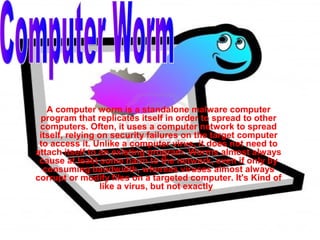
Virus trojanworm
- 1. A computer worm is a standalone malware computer program that replicates itself in order to spread to other computers. Often, it uses a computer network to spread itself, relying on security failures on the target computer to access it. Unlike a computer virus, it does not need to attach itself to an existing program. Worms almost always cause at least some harm to the network, even if only by consuming bandwidth, whereas viruses almost always corrupt or modify files on a targeted computer. It's Kind of like a virus, but not exactly.
- 2. • Each day, worms are becoming a more common occurrence on the Internet. As the incidents increase, we must be thinking proactively in order to lessen the negative effects these worms have on the Internet community. It is important to remember that the livelihood of many businesses is based on an Internet presence. The monetary losses incurred by businesses relating to these worms are hard to measure. Some estimate losses for each occurrence to be around $1 billion. 1 The true value of damages may never be known.
- 3. • Viruses can occur in games of all sort, people can find you username and search you on Google> or if you have an instagram!!!!!! if your following them, they can search you on Google and find out where you live, so don't put your location!!
- 4. • A computer virus is a computer program that can replicate itself and spread from one computer to another. The term "virus" is also commonly, but erroneously, used to refer to other types of malware, including but not limited to adware and spyware programs that do not have a reproductive ability. Malware includes computer viruses, computer worms, Trojan horses, most rootkits, spyware, dishonest adware and other malicious or unwanted software, including true viruses.
- 5. • Viruses can cause computer "break downs" which can turn off your computer completely, this can be caused by people or random links that cause viruses! People can hack your computer when your logged on to FaceBook, Twitter etc.. and hack your account so they can your pictures if you keep it private, some people can stalk you until you leave so they can get to the computer and cause a virus so they "own" your computer!
- 6. • Your system will suddenly slow down. • You will see activity on your screen that you did not cause. • Data files become corrupted or are missing. • Unexpected changes to the content of files. • The program doesn’t run or it functions incorrectly. • Certain features aren’t available anymore.
- 7. • A Trojan horse, or Trojan, is a malicious application that masquerades as a legitimate file or helpful program but whose real purpose is, for example, to grant a hacker unauthorized access to a computer. Trojans do not attempt to inject themselves into other files like a computer virus. Trojan horses may steal information, or harm their host computer systems. Trojans may use drive-by-downloads or install via online games or internet-driven applications in order to reach target computers. The term is derived from the Trojan Horse story in Greek Mythology because Trojan horses employ a form of “social engineering,” presenting themselves as harmless, useful gifts, in order to persuade victims to install them on their computers.
- 8. • 1: Microsoft Process Explorer is an excellent way to determine it!! • 2: Trend Micro’s HiJackThis • 3: Kaspersky’s GetSystemInfo • 4:Microsoft Baseline Security Analyzer • 5: Secunia inspection scanners • 6: Antivirus Programs • 7: Microsoft’s malicious Software Removal Tool • 8: SUPERAntiSpyware • 9: Malwarebyte’s Anti- Malware • 10: GMER
- 9. Definitions… • GMER: An application that detects and removes rootkits. • Masquerades: IPMASQ or MASQ are other names for this. allows one or more computers in a network without assigned IP addresses to communicate with the Internet using the Linux server’s assigned IP address. • IP: Internet protocol, the method by which information is sent between any two computers on the Internet.
- 10. Definitions… • GMER: An application that detects and removes rootkits. • Masquerades: IPMASQ or MASQ are other names for this. allows one or more computers in a network without assigned IP addresses to communicate with the Internet using the Linux server’s assigned IP address. • IP: Internet protocol, the method by which information is sent between any two computers on the Internet.